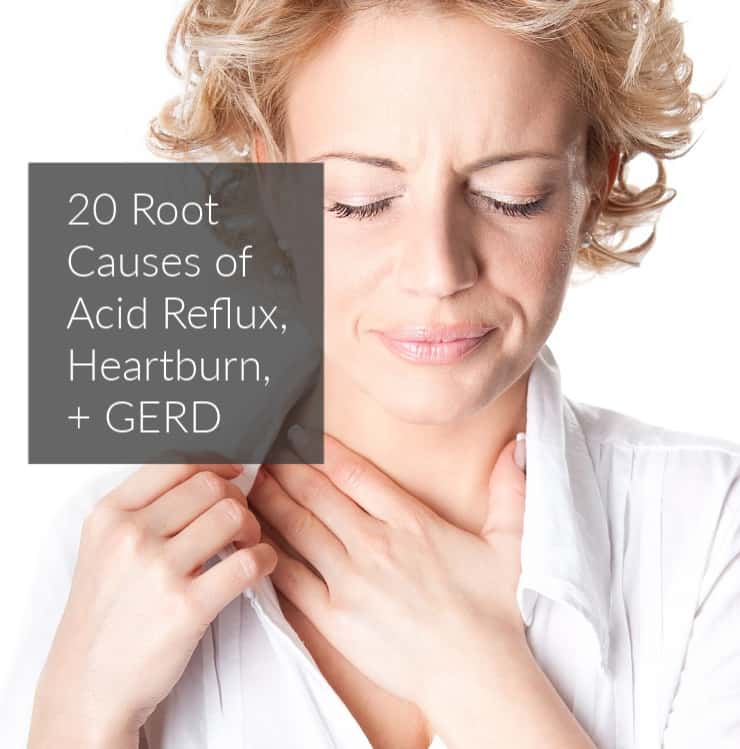If you have acid reflux, you’ve probably been told to reduce your stomach acid with diet or acid lowering medications like proton pump inhibitors (PPI’s). But excess stomach acid is only one of many causes for heartburn, reflux, and GERD and, to get relief, you need to know which root cause is driving your symptoms. We review 20 possible causes, including low stomach acid, small intestinal bacterial overgrowth (SIBO), nutrient deficiencies, and more.

Note from Dena: This post was co-written with Pallavi Abraham, PhD and Dietetic Intern, as part of a research partnership between Back To The Book Nutrition and post-graduate nutrition students from the University of Houston.
Do you suffer from a burning pain or pressure in your chest, a sour or acidic taste in your mouth, frequent burping, or unexplained nausea? You may have heartburn, reflux, or a more serious form of reflux called gastrointestinal esophageal disorder (GERD).
GERD is the most common digestive disorder, occurring in up to 20% of Americans. According to the American College of Gastroenterology more than 60 million Americans experience heartburn at least once a month and about 15 million experience heartburn symptoms every day (1).
What’s the difference between heartburn, reflux, GERD, and NERD?
Some of these terms are often used interchangeably, but there are distinct differences between them.
What is Heartburn?
Heartburn is a burning pain in your chest, just behind the breastbone. This isn’t a condition in and of itself, but rather a common symptom of acid reflux.
What is Acid Reflux?
Acid reflux is the medical term for stomach acid occasionally flowing (refluxing) back up into the esophagus. If reflux becomes chronic, it can lead to GERD.
What is GERD?
Gastroesophageal Reflux Disorder (GERD) is when reflux occurs more than twice per week, leading to inflammation or damage in the esophagus (2).
What is NERD?
Non-erosive Reflux Disease (NERD) is a lesser understood condition in which reflux occurs often, but without damage to the esophagus (5). We won’t discuss NERD in detail here, but it’s important to remember you can still have similar symptoms and associated health risks of GERD even without esophageal damage.
Symptoms of Heartburn, Reflux, and GERD
We’re all familiar with some of the most common symptoms of reflux. But there are some lesser known signs you may want to look out for too.
- Heartburn – This is the main symptom of reflux and GERD
- Chest pain – Pressure in the chest is also common, and can sometimes last a long time and be fairly intense. People sometimes mistake it for a heart attack.
- Burping – This is sometimes called “dyspepsia”
- Regurgitation – A wet burp or even vomiting some of the partially digested food is common.
- Frequent hiccups
- Bitter taste – Acid can make it all the way to the back of your throat leaving a bitter taste and can cause choking if extreme.
- Coughing or Choking
- Sore Throat
- Hoarse voice
- Lump in your throat feeling
- Nausea
- Bloating, especially in the upper abdomen
- Asthma like symptoms
20 Root Causes of Heartburn, Reflux, & GERD
There’s no single cause of heartburn, reflux, GERD, and NERD. To understand what’s causing your particular case, you must look past the symptoms to find and address your root cause(s). Here are 20 of the most common causes – some are widely accepted by the medical community, while others come from a more holistic perspective (3).
1. Excess Stomach Acid (Hyperchlorhydria)
Diet plays a major role in controlling stomach acid. Some foods that commonly trigger acid production and/or relaxation of the lower esophageal sphincter (LES), allowing acid to relflux from the stomach back into the esophagus, include: Spicy foods and herbs (hot peppers, curry, salsa, and mint); citrus fruits (oranges, lemons, limes, grapefruit, and pineapple can cause acid build-up); some vegetables (tomatoes, peppers, eggplant, garlic and onions); meats (high-fat meats, cold cuts, chicken wings, sausage, bacon, poultry skin, and fried or greasy meats); and some beverages (alcohol, coffee, mint tea, hot cocoa, and other caffeinated beverages).
2. Low stomach acid (Hypochlorhydria)
Acid reflux can result from low stomach acid as well! Without normal levels of stomach acid, the lower esophageal sphincter (LES) relaxes, letting the stomach acid flow backwards into the lower esophagus, and causing GERD/reflux. Antacids and Proton pump inhibitor (PPI) medications, are used to conventionally treat GERD, through suppression of stomach acid and reducing reflux. But ironically, their use has shown to enhance GERD symptoms. Low acid can have other consequences on the digestive system, which in turn can worsen GERD symptoms (4).
3. Food sensitivities
In addition to the foods above, some individuals develop sensitivities to specific foods that trigger reflux. “Trigger foods” can vary considerably from person to person but the most common include wheat, gluten, dairy, corn, and soy. (4).
4. Weak or dysfunctional lower esophageal sphincter (LES)
The LES is a valve (toggle switch) that normally prevents stomach acid, bile and enzymes from going back up form the stomach into the esophagus (the tube that connects the throat and the stomach). Certain foods listed in #1 above can relax the LES, as can some medications, smoking, and conditions of low muscle tone like hypotonia and ataxia.
5. Eating a large meal then lying down immediately after
This can allow the LES to open so that acid flows back into the esophagus.
6. Leaky esophagus
In the same way that dysbiosis (imbalance of good and bad bacteria) can cause a leaky gut, dysbiosis in the esophagus can cause leaky esophagus. This may lead to a weak or dysfunctional LES, promoting reflux. Over time, reflux can damage the esophagus, making it even more leaky, creating a vicious cycle (5).
7. Low serotonin
There are serotonin receptors in the esophagus and some studies have linked low serotonin to dysfunction of the LES. Likewise, interventions that increase serotonin have shown promising effects on LES function, motility, and reflux (15).
8. Delayed gastric emptying/slow motility (food stays in the stomach or small intestine too long)
This can lead to overgrowth of bacteria or yeasts and increased gas and bloating, which puts pressure on the LES and can cause it to open, allowing stomach contents to reflux back up into the throat.
9. Low digestive enzyme production
Enzymes are secreted in the saliva, the stomach, and the small intestine to help digest food. Low enzyme output in any of these areas can lead to poorly digested food, bacterial or fungal overgrowth (as these organisms “feed” on the food particles), which increases abdominal pressure from bloating and gas, resulting in reflux (16).
10. Small Intestinal Bacterial Overgrowth (SIBO) or Small intestinal Fungal Overgrowth (SIFO)
SIBO leads to increased gas production forcing the LES to open and cause acid reflux (a feedback effect) (6). Similar to SIBO, a fungal overgrowth in the small intestine can cause increased gas production, triggering the LES to open and acid to reflux into the esophagus.
11. Liver-Gallbladder Dysfunction or Gallstones
Reduced bile flow from the liver or gallbladder (called cholestasis) can cause a buildup of bile in either organ. If not resolved, gallstones can develop, resulting in symptoms of fatigue, nausea, pain in the upper right quadrant of the abdomen, and – in some cases – heartburn or reflux. Bile reflux is considered a separate condition than acid reflux, but both can occur together and have similar symptoms, making it hard to distinguish between them (16).
12. Nutrient Deficiencies
Deficiencies in zinc, B vitamins, and magnesium can all contribute to reflux.
13. Stress
Chronic stress reduces stomach acid production, thus causing acid reflux (7). Stress can also make people smoke, drink alcohol, and indulge in acid promoting foods listed above, triggering reflux. Download our free, 3 Step Guide to Stress Management here!
14. Overweight or Obesity
Individuals who are overweight or obese are at 2.5 times higher risk of GERD due to the increased pressure placed on the stomach and esophagus by abdominal fat (8).
15. Helicobacter Pylori (H. Pylori) infection
About half the population has H.pylori. At low levels it may not be harmful, but higher levels can contribute to ulcers, heartburn, acid reflux and all other symptoms associated with GERD (8-10). Newer evidence suggests that H.pylori infection may play a protective role in GERD patients, by lowering LES pressure and acid reflux, but more evidence is needed to confirm this possibility (11).
ULTIMATE GUIDE TO H.PYLORI – BEST TESTS, TREATMENT OPTIONS, & HOW TO PREVENT RECURRENCE
16. Hiatal Hernia
Is a condition when the top part of the stomach bulges up into the chest cavity preventing the LES from closing completely, thus promoting acid reflux. Seen more commonly in people above the age of 50 and in obese individuals.
17. Pregnancy
It is estimated that at least half of all the pregnant women experience acid reflux, with it starting at anytime of the pregnancy, but most common after 27 weeks due to increasing abdominal pressure.
18. Hypothyroidism
Thyroid hormone is needed for the entire body to run at optimal levels. Sluggish thyroid function can cause foods to sit longer in the stomach/upper GI tract and can reduce LES tone. Either/both of these can make heartburn and reflux more likely.
19. Hormone Imbalances
Reproductive hormones like estrogen, progesterone, and testosterone act on the GI tract as well, and imbalances in one or more of these hormones can promote heartburn/reflux in some cases. Similarly, hormone related medications (birth control, etc.) or hormone replacement therapy can have an impact on symptoms.
20. Smoking
Smoking relaxes the LES, resulting in reflux. Similarly, secondhand smoking and chewing tobacco also are detrimental, promoting GERD and acid reflux. Furthermore, coughing is a side effect of smoking that also increases pressure in the stomach, causing or worsening acid reflux.
21. Medications
Pain relievers like aspirin, nonsteroidal antiinflammatories (NSAIDS) like ibuprofen (Advil and Motrin), blood pressure drugs called calcium channel blockers, antihistamines for allergies, benzodiazepines for anxiety (Xanax, Klonopin, Valium, etc.), certain antibiotics like tetracyclines, pain medications like opioids (Hydrocodone, Oxycontin, etc.), oral osteoporosis drugs like bisphosphonates (Boniva, Fosamax, etc.), and anticholinergic drugs used to treat a variety of disorders from overactive bladder to COPD can all cause acid reflux (3).
22. Scleroderma
An autoimmune disease that attacks the body’s connective tissue , causing food to move slowly through the digestive tract and preventing the LES from closing properly and causing acid reflux.
What Are The Health Risks of Untreated GERD ?
GERD is about so much more than nagging symptoms. If it’s not addressed at the root level, it can have serious long term effects on your health, including:
- Nutrient Deficiencies – Improper protein digestion due to low acid production, leads to poor absorption of nutrients like calcium, iron, zinc, B12, and folate causing their deficiency in the body (12).
- Small Intestinal Bacterial Overgrowth (SIBO) and other forms of bacterial overgrowth – SIBO is not only a potential cause of reflux, it can be a result of it too! If stomach acid is low (whether naturally or as a result of taking acid-suppressing medications), undigested food moves too slowly through the digestive tract, allowing bacteria to grow and multiply.
- Small Intestinal Fungal Overgrowth (SIFO) and other forms of yeast overgrowth – Similar to SIBO, yeast and fungi can feed on undigested food that moves too slowly through the GI tract.
- Suppression of digestive enzymes and bile – proper stomach acid signals the body to release digestive enzymes and bile (to break down food for absorption). If stomach acid is low, these other “digestive juices” may also be low, making nutrient deficiencies and bacterial/yeast overgrowths worse.
- Leaky gut – Low acid production can cause improper digestion of starch/carbohydrates promoting the growth of harmful bacteria that thin the lining of the intestines, making it leaky and allowing undigested food particles to move into the bloodstream. (13)
- Barrett’s esophagus – is a condition where the cells of the esophagus are damaged due to continuous acid reflux and get replaced by cells in the intestine. Sometimes this may lead to esophageal cancer (14).
The Bottom Line
Reflux and GERD are multifactorial disorders that can have a major impact on both quality of life, both with respect to the immediate symptoms as well as the long term health risks. If you suffer from heartburn, reflux, or GERD, be sure you’re investigating and addressing root causes, not just managing your symptoms!
Learn More about 20 Natural Remedies for Heartburn, Reflux, and GERD here!
About the Co-Author
Pallavi Abraham is currently a dietetic intern at the University of Houston. Driven by real life events, she embarked on her journey to become a dietitian after earning a PhD in Biochemistry and gaining extensive experience in cancer research at The University of Texas MD Anderson Cancer Center. She is passionate about becoming a clinical dietitian and practicing in the field of integrative and functional nutrition. Pallavi is married with two school going kids and in her free time loves to travel with her family.
Disclaimer: Information on this site is intended only for informational purposes and is not a substitute for medical advice. Always consult with a trusted healthcare provider before implementing significant dietary change. Read additional disclaimer info here.
References:
- American Collage of Gastroenterology: Acid reflux. http://patients.gi.org/topics/acid-reflux/
- Healthline: Emergency Acid Reflux Symptoms. https://www.healthline.com/health/gerd/emergency-symptoms
- Health: Things That Could Be Giving You Acid Reflux. https://www.health.com/heartburn/acid-reflux-causes
- Dr. Ruscio: Gastroesophageal Reflux with Dr. Ben Weitz. https://drruscio.com/gastroesophageal-reflux-dr-ben-weitz/
- Kresser, C. Is Heartburn Caused by a Leaky Esophagus? https://chriskresser.com/is-heartburn-caused-by-leaky-esophagus/
- Schatz, TA, et al. Predisposing factors for positive D-Xylose breath test for evaluation of small intestinal bacterial overgrowth: a retrospective study of 932 patients. World J Gastroenterol. 2015 Apr 21:21(15):4571-82. https://www.ncbi.nlm.nih.gov/pubmed/25914466
- Medical News Today: What is Hypochlorhydria? https://www.medicalnewstoday.com/articles/322491.php
- Hyman, M. 7 Steps to Reverse Acid Reflux. https://drhyman.com/blog/2013/09/26/7-steps-reverse-acid-reflux/
- Polat and Polat. The Effect of Helicobacter Pylori and Gastroesophageal Reflux Disease. JSLS. 2012 Apr-Jun;16(2):260-263. https://www.ncbi.nlm.nih.gov/pmc/articles/PMC3481226/
- Myers, A. What Your Doctor Didn’t Tell You About GERD. https://www.ncbi.nlm.nih.gov/pmc/articles/PMC3481226/
- Kawai T, Yamamoto K, Fukuzawa M, Yamagishi T, Yagi K, Fukuzawa M, Kataoka M, Kawakami K, Itoi T, Sakai Y, Moriyasu F, Takagi Y, Aoki T. Helicobacter pylori infection and reflux esophagitis in young and middle-aged Japanese subjects. J Gastroenterol Hepatol. 2010 May;25 Suppl 1:S80-5. doi: 10.1111/j.1440-1746 .2010.06228.x. PubMed PMID: 20586872. https://www.ncbi.nlm.nih.gov/pubmed/20586872
- Kresser, C. Get Rid of Heartburn and GERD Forever in Three Simple Steps. https://chriskresser.com/get-rid-of-heartburn-and-gerd-forever-in-three-simple-steps/
- De Bortoli, N., et al. Gastroesophageal reflux disease, functional dyspepsia and irritable bowel syndrome: common overlapping gastrointestinal disorders. Ann Gastroenterol. 2018 Nov-Dec;31(6): 639-648. https://www.ncbi.nlm.nih.gov/pmc/articles/PMC6191868/
- Healthline: Barrett’s Esophagus and Acid Reflux. https://www.ncbi.nlm.nih.gov/pmc/articles/PMC3481226/
- Mittal, R., et al. Neurotransmitters: The critical modulators regulating gut-brain axis. J Cell Physiol. 2017 Sep;232(9): 2359-2372. https://www.ncbi.nlm.nih.gov/pmc/articles/PMC5772764/
- Mayo Clinic: Bile Reflux. https://www.mayoclinic.org/diseases-conditions/bile-reflux/symptoms-causes/syc-20370115





This is so informative..! I didn’t have any of these health issues yet but so glad to be aware of it.. I really enjoyed reading your blogs..!
Thanks for the comment Twins!
There is so many reasons for it. very informative post, thank you.
Laura
https://pinkfrenzymissl.blogspot.com/
Stress is the cause to a lot of issues in some of my client’s lives. We have family members who’ve battled with acid reflux for years.
Stress management is something that most of us could work on.
Very informative. Never thought GERD had so much to it.
Thanks for your comment Bindu. I hope that the information is helpful!
Very informative and well worth a read. You’ve covered a lot of ground about Acid Reflux. I’ve never been much of a sufferer but get occassions where it kicks in.
It definitely something to keep an eye on Owen. Thanks for your comment!
Been experiencing this and it was really hard. Thank you for sharing more information about this to me things a little bit clear to me why and where do I get this.
I am glad you found us, and I hope that you are able to get some relief!
This was actually really interesting. Always wondered why they call it heart burn when it doesn’teven involve your heart
Thanks for the comment!
This was very informative. Thank you. I’m so happy I have never experience this but my dad use top all the time. Can it be hereditary?
Hi Ching,
I would say it’s possible. There are some underlying hereditary issues that can affect the development or function of the GI tract and therefore could lead to reflux. But I would wager this makes up a very small percentage of people with symptoms. More often, food behaviors, lifestyle factors, etc. can be similar among family members causing multiple members in the same family to be affected. Hope that helps!
I have suffered from ulcers and Gerd off an on throughout my life. It really is a terrible thing to live with. This post really explained a lot!
I hope that you can get some relief Melanie. If you want some additional help feel free to schedule a free introductory call with us.
Starting a couple of months ago, I’ve started waking up with heartburn every few days. This is a great article to help me begin pinpointing what the potential issues could be. Thank you!
Emily, I appreciate your comment, and really hope that you find some relief. If you would like some help with this issue feel free to schedule a free introductory call with me.